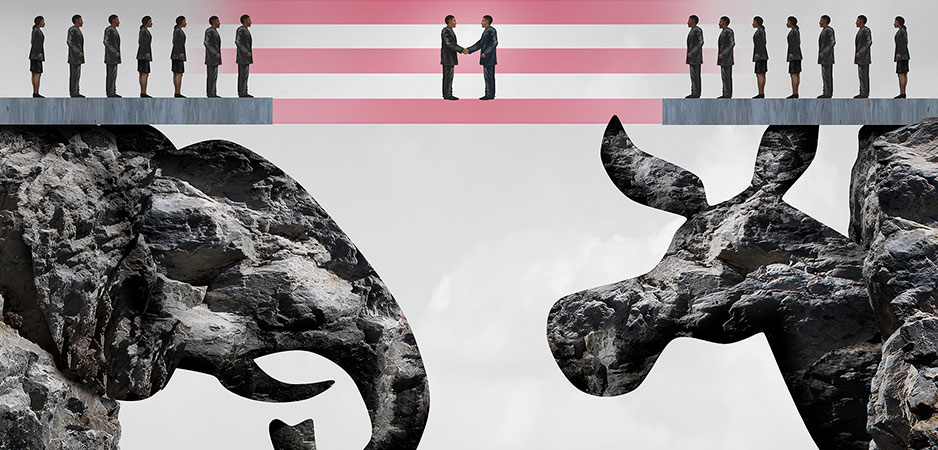New York Times reporter Astead W. Herndon introduced his post-election interview with Alexandria Ocasio-Cortez by reminding readers how the ebullient progressive Democrat has dutifully played the role the Democrats requested of her during the presidential election campaign. “For months,” he wrote, “Representative Alexandria Ocasio-Cortez has been a good soldier for the Democratic Party and Joseph R. Biden Jr as he sought to defeat President Trump.”
Here is today’s 3D definition:
Good soldier:
A metaphor applied to anyone who obeys even ill-conceived orders commanded by an abusive authority and who will be valued not for their valor as a solider or their integrity as a citizen, but only for the number of enemies they have killed.
Contextual Note
Herndon’s choice of metaphor perfectly sums up the attitude of a party that, since Lyndon Johnson’s presidency, has consistently glorified war. It is also a party that increasingly celebrates billionaires, Rhodes scholars, intelligence officers and generals while marginalizing the lowly, which includes bartenders, bus drivers and other “deplorables,” as well as its own loyal foot soldiers.
Alexandria Ocasio-Cortez began her wage-earning career as a bartender before demonstrating her talents as a political strategist. At the same time, she capitalized on her budding stardom by accepting to play the foot soldier for the Democrats. In the interview, she recounts her forays against the Republican enemy during this election campaign: “I offered to help every single swing district Democrat with their operation. And every single one of them, but five, refused my help.”
Mainstream Democrats see Republicans as their rivals and Alexandria Ocasio-Cortez as their enemy. And not only her, but the majority of Democratic voters, who polls tell us clamor for single-payer health insurance and free college. In the interview, Ocasio-Cortez tries to warn her colleagues that “their base is not the enemy.”
Ocasio-Cortez exposes the fundamental issue both parties will have to deal with after Joe Biden’s victory: redefining their base. Do they even have one? Donald Trump proved that something resembling a base existed on the right side of the spectrum. He gave it a forceful voice. It appealed to xenophobia and a rejection of what might be called urban values in favor of an illusory small-town and suburban ideal that has always occupied a sentimental place in America’s imagination. How ironic that it was a wealthy Manhattan real estate mogul who managed to mobilize those energies. The Democrats have not even tried to define their base, hoping that people will assume it’s the working class.
To the question, “What can we expect from you in the next four years?” Ocasio-Cortez replied: “I don’t know. How the party responds will very much inform my approach and what I think is going to be necessary.” The party has shown no interest in understanding what it claims to be its working-class base. She expects the party to continue its “smothering approach” to anyone who seeks to respond to the increasingly evident needs of the base. She describes its effects: “It’s the stress. It’s the violence. It’s the lack of support from your own party. It’s your own party thinking you’re the enemy.”
In his victory speech Saturday evening, Biden promised to unify the nation: “Let this grim era of demonization in America begin to end here and now.” How about unifying the party? Will the party under Biden’s leadership end its demonizing of its own most dynamic members? Biden ended his victory speech with this idea: “Spread the faith.” “Spreading” — the faith, the truth or anything else — in Latin is “propagare,” from which the word “propaganda” is derived. Is that what Biden is proposing for the next four years: faith instead of action and moderate mainstream propaganda to replace Trump and Pompeo’s populist right-wing agenda?
Historical Note
Alexandria Ocasio-Cortez wonders “whether the party is going to be honest about doing a real post-mortem and actually digging into why they lost.” History tells us that’s unlikely. The experience following the 2016 election revealed the Democrats’ chronic incapacity to conduct an honest autopsy of their defeats. They condemned Donald Trump’s personal bombast and vanity. But the Democratic Party as a whole shares those vices. It targets different enemies, but its methods are similar. The vain and bombastic never admit past mistakes. Instead, they always seek someone else to blame for their own failures.
Donald Trump set the tone when he began his first presidential campaign in 2015. He blamed the Mexican people for everything that was troubling a nation still reeling from a crisis engineered and precipitated a decade earlier, not by Latinos, but by the financial wizards of Wall Street. Once elected, Trump chose a new bugbear: Muslims. He did this even while kowtowing, on his first foreign visit, to Saudi Crown Prince Mohammed bin Salman, the despotic ruler of the oil-rich kingdom that had supplied 15 of the 19 9/11 hijackers. Finally, when a global pandemic wreaked havoc on the US economy, threatening his prospects for reelection, Trump blamed the Chinese.
Trump’s consistency in blaming other groups of people manifestly inspired the Democrats. Taking the hint from Hillary Clinton after her ignominious defeat to the least qualified candidate in the history of American elections, the Democratic Party claimed that all the fault could be laid at the feet of the Russians. That produced three years of media and courtroom drama, culminating in a farcical impeachment that essentially revealed the inanity of the entire exercise and the futile absurdity of the Democrats’ strategy.
Nothing beyond the anecdotal justified either Trump’s accusations against the nation of his choice or the Democrats’ demonization of Russia. Worse, this voluntary blindness allowed both Trump and the Democrats to avoid using the existing evidence to seek a deeper understanding of the weaknesses of the nation’s political culture. They preferred to deflect blame by promoting the blanket judgment of an entire nation, people or race.
In Saturday’s speech, Biden proclaimed: “The refusal of Democrats and Republicans to cooperate with one another, it’s not some mysterious force beyond our control. It’s a decision. It’s a choice we make. And if we can decide not to cooperate, then we can decide to cooperate.”
Has the president-elect’s absence from politics after his eight years as vice president and his retreat into the basement in 2020 blinded him from the reality of the growing instability within both parties? Defining the nation according to a simple binary opposition of Republicans vs. Democrats is a worn-out heritage of the 20th century, when people accepted and even clung to those labels. Both parties are now clearly divided, if not fragmented. The labels have lost their meaning.
Large swaths of Americans now perceive both parties for what they are: two clubs of privileged oligarchs and moneyed interests that have acquired the habit of sharing the same resources, managing them in their common interest and disguising their collusion by bickering petulantly in public over trivialities. They thereby create the impression, exploited by the media, that they are dealing with serious issues. This political pantomime enables the parties to agree on “reasonable compromises” designed to obscure the real issues, at best papering over problems rather than addressing them. At worst, it means applying King Solomon’s justice literally by cutting the baby in two while offering the contending ladies their blessings and then wishing them better luck after the next election.
Nothing today indicates that Joe Biden will even try to mobilize the resources and the political will needed to solve the pressing issues he has himself promised to address. Whether it’s COVID-19, the plight of working people in a crippled economy, climate change or racial injustice, the compromises Democrats and Republicans habitually make have long been the source of these problems rather than their solutions.
The two parties are prisoners of a system of their own making that aggravates crises. And the crises listed above are all coursing toward a tipping point beyond which systemic implosion looks inevitable. Sudden collapse can no doubt be avoided, and Joe Biden should be better at avoiding it than Trump. But it can only be achieved at the price of acknowledging that collapse is actually threatening. That is something neither party will accept to do.
*[In the age of Oscar Wilde and Mark Twain, another American wit, the journalist Ambrose Bierce, produced a series of satirical definitions of commonly used terms, throwing light on their hidden meanings in real discourse. Bierce eventually collected and published them as a book, The Devil’s Dictionary, in 1911. We have shamelessly appropriated his title in the interest of continuing his wholesome pedagogical effort to enlighten generations of readers of the news. Read more of The Daily Devil’s Dictionary on Fair Observer.]
The views expressed in this article are the author’s own and do not necessarily reflect Fair Observer’s editorial policy.
Support Fair Observer
We rely on your support for our independence, diversity and quality.
For more than 10 years, Fair Observer has been free, fair and independent. No billionaire owns us, no advertisers control us. We are a reader-supported nonprofit. Unlike many other publications, we keep our content free for readers regardless of where they live or whether they can afford to pay. We have no paywalls and no ads.
In the post-truth era of fake news, echo chambers and filter bubbles, we publish a plurality of perspectives from around the world. Anyone can publish with us, but everyone goes through a rigorous editorial process. So, you get fact-checked, well-reasoned content instead of noise.
We publish 2,500+ voices from 90+ countries. We also conduct education and training programs
on subjects ranging from digital media and journalism to writing and critical thinking. This
doesn’t come cheap. Servers, editors, trainers and web developers cost
money.
Please consider supporting us on a regular basis as a recurring donor or a
sustaining member.
Will you support FO’s journalism?
We rely on your support for our independence, diversity and quality.






